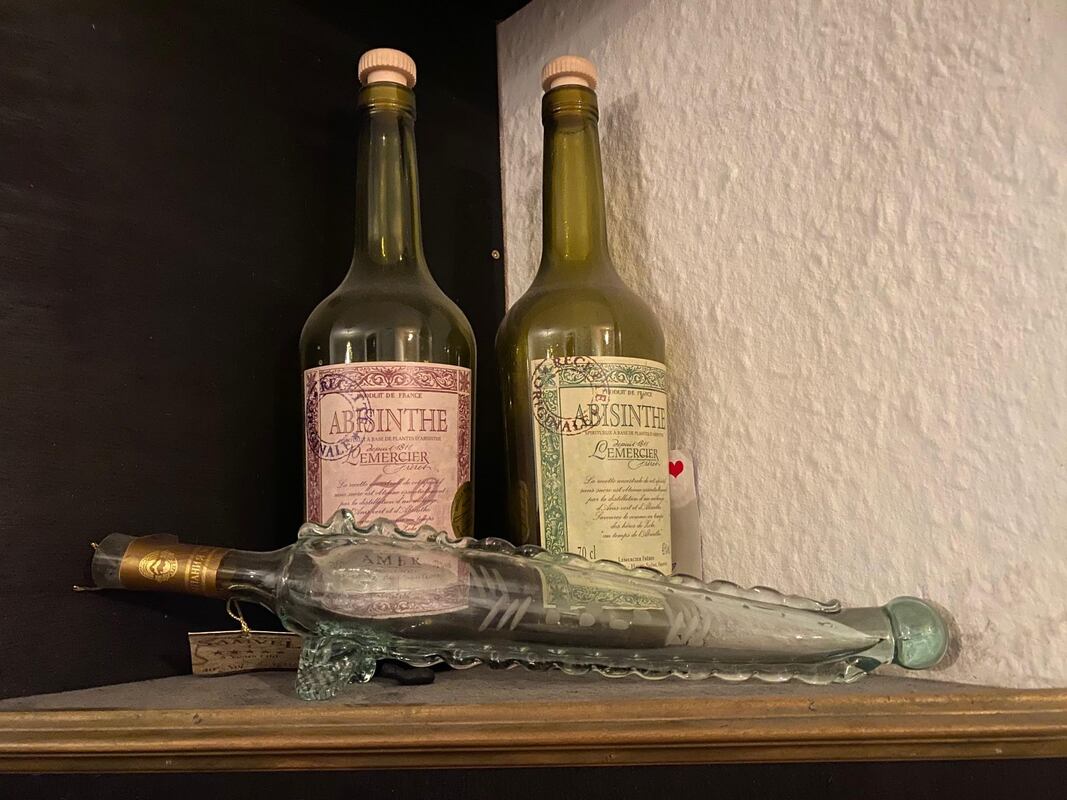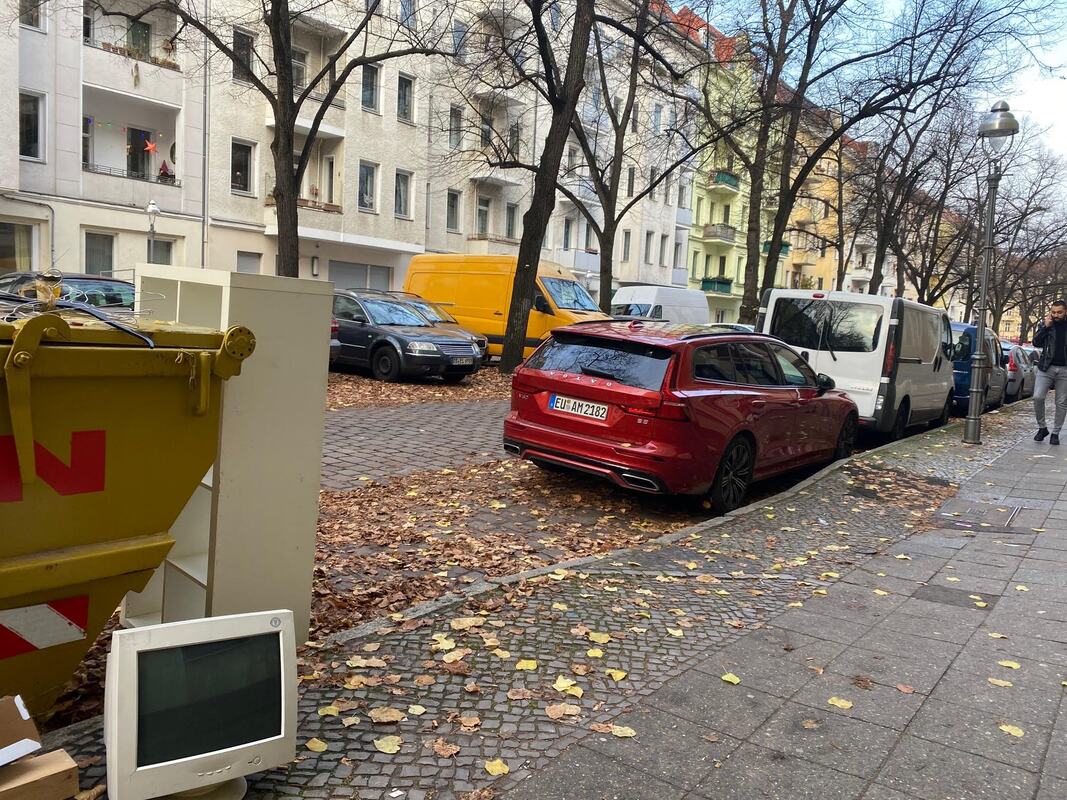|
In which the writer marks her first year back in Berlin with a foray into the colliding worlds of myth and reality, I celebrated completing my first year back in Berlin this week, marked the occasion with a remote call with the two friends – Ben and Alice - who had felt most like 'family' in Hong Kong –beleaguered but kindhearted journalists from my old newspaper who also happen to be some of the wittiest and most cynical people I’ve ever met. I gave them a tour of my new place, an eerily charming and quite expansive space with creaking floorboards that I discovered via the city’s journalism circuit. Here, chandeliers hang from high ceilings, an 150-year-old ‘atmospheric’ sounding piano complete with candle-holders stands next to a full-blown walk-in bar of dark wood and faux-gold furnishing and a beer tap that appears to only serve aesthetic purposes, as black-and-white illustrations and maps showcasing the Berlin of yesteryear abound. A panel of blood-red wallpaper completes the look. Lighting is quite low, so many of my evenings are accompanied by the glow of candlelight, placed next to the large, fat-stemmed and rather mysterious purple and white flowers I bought. I've left their fallen petals to wilt. A luxurious enough experience can be had lounging on the baroque-style, sheepskin-rug-bedecked sofa overlooking the hinterhof complete with trees that now sulk with their forlorn and jagged winter nudity, though the highlight of the space can be found in my bedroom, which is certainly more regal than any I’ve ever occupied and which overlooks a rather quaint graveyard. In self-help books we’re told to create a visual image of who we most desire ourselves to be. I’ve always had this picture of myself, feet propped up at a vast and powerful-looking desk complete with pillars of of books and papers, with a cigar in hand. This desk here comes close to that visual, though it’s of a rather grim and haunting dark wood that exudes undead vibes. “You’re renting from Dracula, aren’t you, Sarah?,” Ben says. I wouldn’t say Dracula so much as I feel like this place resonates more on a Huysman level. Huysman’s book Against Nature (À rebours) was one of my favourites at university, a recommendation from a tutor who always knew exactly what I needed to read, a rare talent that never goes amiss. Looking it up now, I find a version of an early translation in which its first page opens with the subtitle "A Novel without a Plot". Brilliant. Novels without plots, plots without novels Against Nature (described in on review I read as “one of the strangest books ever”) follows the eccentric Jean des Esseintes– the last scion of an aristocratic family– as he shuffles wearily around in a robe rarely leaving his luxurious but somewhat haunting home bemoaning the modernity and chaos of the outside world, entertaining himself with classical French and Latin literature of specific eras (the only good ones, he insists) and the companionship of a tortoise who he inadvertently kills when he sticks jewels onto its shell. As students of literature we are taught to think about the messages characters have for us in the present day. The book was written in 1884, and des Esseintes is presented as a relic of a bygone time, having retreated completely into a world of fiction he believes far suits a person of his lineage in an age of social and technological upheaval. (In 1895, by way of example, the Lumière brothers — pioneers of film — produced a short movie of a steam train roaring down a railroad, which marked the onset of the moving image, to name one major development that brought about the rise of mass culture). Des Esseintes is an interesting character to think about for a number of reasons, not least that if he lived today and had assess to Wifi, I can see him as one of those anonymous internet troll decrying all sorts of things in a last ditch effort to maintain a semblance of relevance ('to feel heard') In a world in which he can't keep up. (#notallaristocraticscions) The character also has a rare and specific "decadent" illness not without overtones of vampirism (a spectre that best symbolises these old-world/new-world clashes and fears that Decadent literature so evocatively explored). He is sickly and prone to sensory oversensitivity such that, in fact, books, books more books accompanied by the strange orientalist gongs of the so-called "East" that he has farmed in from worlds he has never seen (Said eat your heart out)– suffice in sustaining his creativity and enjoyment of life such that he never need step outside, nor seek companionship at all). Some people seem to think the onset of new technologies like AR and VR will turn us all into Des Esseintes. I am not ruling out the possibility. But it should be said that humanity has been inoculating itself against the realties of the world through fiction for millennia. We've always had access to that form of escape – the more shrewd humans among us have always found ways around the mythological noises that take us off course from the truth, however enchanting (and in many cases, rewarding) these meanders might be. A globetrotting granny Sometimes when I think about Des Esseintes and the question of fiction as escape (versus fiction as freedom), I think about my grandmother, a singular and cerebral working class woman who decided quite early on that the likelihood of finding a man who would show her the world she dreamed of seeing was quite slim in sleepy Tunbridge Wells. So in lieu of the pursuit of a husband she taught herself five languages and worked as a secretary in a multinational organisation. She met my grandfather while she was working in Vienna. Her marriage to the Hungarian Calvinist of Transylvanian roots was short. Some years later, she had an affair in what is now the Republic of Congo, but if I am correct spent her longest stint in the city that agreed most with her besides London: Paris. This is why I have a half-Malaysian half-uncle with a Hungarian surname who speaks French like a Parisian. If there was one thing that charmed my grandmother more than travel and the promise of new worlds, it was the world of ballet. All she wanted to do in her retirement was attend every dance institute in the area. She was probably a patron of more than she could afford, might have single-handedly kept many open. She lived for these fictional worlds, they sustained her in a way the real world couldn't. Conversations over the phone always centred around that season's theatre and dance programmes, and I was supplied with more novels from her while I was growing up than I knew what to do with. Of course she was the person who gave me my two favourite books from childhood: Little Women, and Chinese Cinderella – the latter being the work that sparked my own dream of globetrotting adventures I eventually realised (an event in which myth collided quite rudely with reality). Prone to falls and incidents one assumes come hand-in-hand with being rater bookish and otherworldly (as opposed to robust, coordinated and grounded), my grandmother approaches her 90s with a surprising lucidity and promising bill of health, despite having always been too "something or other" for this world. Smart, maybe? This said, she has recently moved into an old people's home, a confronting experience which has inspired some of degree of myth-making on her part. "These women are all prostitutes or lesbians!" she has said on one of those days she has in which her grip on reality is less strong. But anyway, back to Against Nature. I love the symbolism and the haunting hopelessness of the work, it's so eerie and meandering and mystical, captures the sort of total retreat into introspective god-knows-what-world that can happen to some circles during times of seismic change. That poor tortoise. To hammer down my point: In the words of my best friend from school, Ceyda: “I hate Trump because he totally took the fun out of conspiracy theories”. It's true. The fun has been taken out of myth-making and risky meanders from the truth. Our other school friend, an artist-turned-social worker specialising in drug addiction –who is my best source for understanding London's increasingly worrying crystal meth scene, (alongside the best confidante I've ever had), no longer sends me bizarre articles about airports designed by the illuminati from 'Vigilant Citizen,' the website that also inspired some of her weirdest illustrations. Our WhatsApp group is still riddled with snapshots of Occultish dolls and Victorian taxidermy fails, though. She most recently reports a great time to have been had at her virtual 'Moon circle' retreats, an activity she squeezes in between virtual gong baths and sobering phone calls with clients from all walks of life, and phone calls with me. Last month, when I was struggling with a greater degree of emotional disturbance than felt manageable at the time, I spoke to her about wanting some kind of emotional vasectomy, something that could efficiently remove these feelings from me so I wouldn't have to bother with them. "We all want that sometimes, Sarah. That's literally why people take drugs," she said. To return to our main event But, actually, my understanding is that, the previous tenant here was not Dracula, nor an aristocratic scion-turned-nutty-mystic, but a rather jolly German man who, according to neighbours, was prone to noisy, convivial late-night antics. “You mean sex parties?” Ben queries. Possibly, who knows about the stories that came here before mine. “I’d love to see you at a sex party,” Ben adds. “Standing politely in the corner saying stuff like ‘how nice it is we all get to spend time together like this.” The neighbourhood is quite different from the one I recently left. On my evening walks, which have now transformed into evening runs –the time of my day in which I feel most alive during these bizarre soon-to-be-mythologised, socially-rupturing lockdown times, – I am far more likely to bump into a drunk than a pram-wheeling lady holding a chia seed smoothie. One practise that continues here, as it did in Prenzlauer ‘pregnant lady’ Berg is that of people leaving items out for scavengers such as myself to root through. I’ve always enjoyed accumulating other people’s things, especially when their story is mine to try and interrogate, bring to life somehow, create fictions in the between spaces of their cracked realities. I now own a scratched gold watch, a flamingo figurine, a pink teacup and a forlorn and slightly ripped photo of someone’s dog, among many other decaying oddities. I’m not sure what to do with any of it but I am glad they are here in this, in this hall of dark, enchanting and zany things during these strange, long months –ready to recycle themselves out of their oblivion into some new story, a decadent meander between fiction and truth. Yours, Vlad the Impaler x. p.s. New (O.K, recently rediscovered #content uploaded elsewhere)
0 Comments
|
Sarah KaracsA Berlin-based writer engages in the study of belonging and in-between places after years spent faraway from 'home'. Archives
August 2023
Categories
All
|


 RSS Feed
RSS Feed